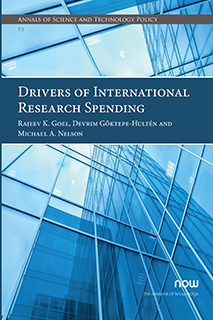Drivers of International Research Spending
By Rajeev K. Goel, Illinois State University, USA, Kiel Institute for the World Economy, Germany, and Institute for Studies on the Mediterranean (ISMed), National Research Council (CNR), Italy, rkgoel@ilstu.edu | Devrim Göktepe-Hultén, Lund University, Sweden, devrim.goktepe-hulten@fek.lu.se | Michael A. Nelson, University of Akron, USA, nelson2@uakron.edu
Abstract
There has been significant theoretical and empirical research on the causes and effects of research and development (R&D) spending; however, the incentives of individual firms to engage in such an investment, especially firms that differ in characteristics and the institutional settings they operate in, are not well understood. This monograph adds to the literature on the economics of technical change, with a primary focus on research spending as the key input in innovation, in two ways. First, it provides an overview and a critical appraisal of the literature on the drivers of research spending, especially focusing on the extant empirical studies in recent years. Second, it provides estimation results from the determinants of research spending across a large sample of mostly emerging nations using data at the firm level. Based on these findings, implications for technology policies and directions for future research are discussed.
Drivers of International Research Spending
Drivers of International Research Spending contributes to the literature on the economics of technical change in two ways. First, it provides an overview and a critical appraisal of the literature on the drivers of research spending, especially focusing on the extant empirical studies in recent years. Second, it provides a unique insight into the empirical determinants of research spending using micro or firm-level data on research spending decisions across a very large sample of mostly emerging nations. Firm-level information on research enables the consideration of many characteristics (e.g., size, vintage, ownership, etc.) of firms that perform research.
This monograph is organized as follows. The authors begin by presenting a schematic diagram that describes their vision about what constitutes R&D, its various dimensions, and the key players involved in such activity. Next, they present an extended overview of the literature on the causes and effects of technical change, including the drivers of research spending. The authors then discuss micro-level data sets on technical changes and R&D activity, with special attention given to the Enterprise Surveys (ES) dataset organized through the World Bank, which is employed in modeling cross-country firm-level R&D decision-making. Finally, the monograph provides recommendations for technology policy and suggests some directions for future research.
